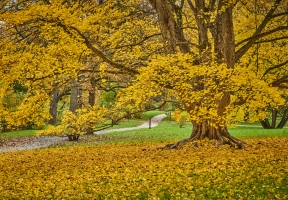
The Morton Arboretum is encouraging people to save and repurpose falling leaves to nourish their gardens this autumn. According to the Arboretum’s expert Plant Clinic advisers, leaves make great insulation, compost and enrichment for garden soil. “Decomposing leaves enrich the soil by releasing nutrients that support plant growth and strengthen root systems,” said Plant Clinic Manager Spencer Campbell. Leaves also act as nature’s insulation, protecting plant roots from extreme temperatures and providing shelter for seeds that will sprout in spring. “When we spread mulch in our gardens, we’re mimicking how nature forms a protective, nourishing layer of leaf litter,” Campbell said. The dark brown mulch used throughout the Arboretum’s gardens is made from partially decayed leaves. Campbell provided these gardening tips for managing and using fallen leaves:
• Use leaves for mulch. Rake fallen leaves on perennial beds, vegetable gardens or around trees and shrubs. By spring, most of the leaves will have broken down and disappeared, as busy soil microbes consume them. The leaves can also serve as protective covering for native bumble bees, butterflies, moths and other pollinators that burrow and hibernate in the soil during winter.
• Make compost. Leaves are a major ingredient in any successful compost pile. Mix them up with end-of-season annuals, weeds and selected vegetable and fruit kitchen scraps. After a few months, the resulting compost can be applied as a soil amendment, top-dressing or mulch.
• Insulate. Use a layer of leaves in a vegetable garden as insulation against autumn freezes and winter cold to prolong the fall harvest. They can protect late crops, such as cabbage or spinach, when an overnight frost is predicted. When leaves are piled over the beds of root vegetables, such as carrots and beets, the soil will freeze more slowly, allowing more time to harvest the roots. Leaves also make good insulation around tender ornamental plants, such as hybrid tea roses, contained by a cylinder of wire mesh or burlap, to prevent winter injury.
For more fall gardening tips, visit mortonarb.org. The Morton Arboretum Plant Clinic is generously sponsored by Bartlett Tree Experts.
Photo Credit: Morton Arboretum








